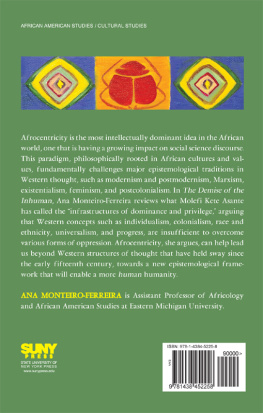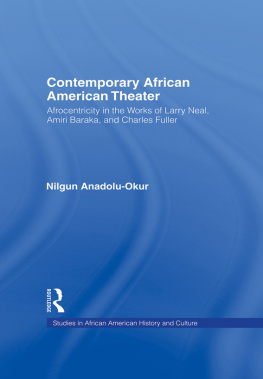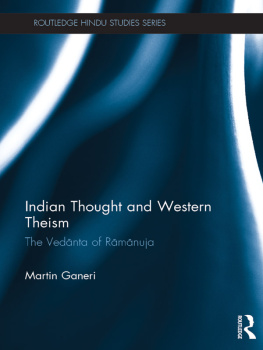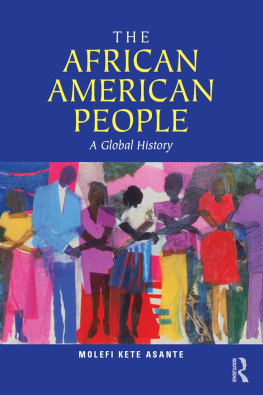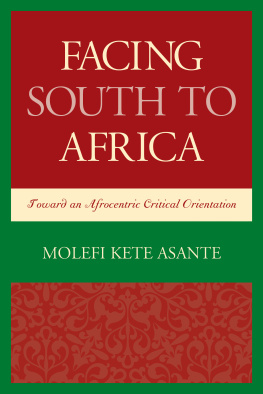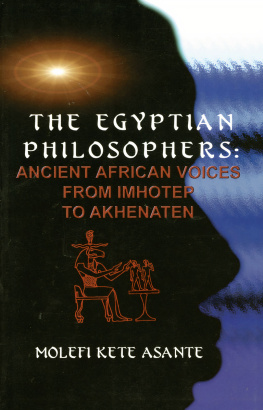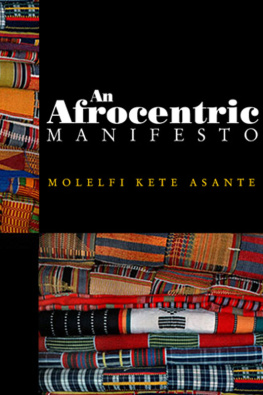THE DEMISE OF THE INHUMAN
The Demise of the Inhuman
Afrocentricity, Modernism, and Postmodernism
ANA MONTEIRO-FERREIRA
Foreword by Molefi Kete Asante
Cover painting entitled Harmony-I by the author
Published by State University of New York Press, Albany
2014 State University of New York
All rights reserved
Printed in the United States of America
No part of this book may be used or reproduced in any manner whatsoever without written permission. No part of this book may be stored in a retrieval system or transmitted in any form or by any means including electronic, electrostatic, magnetic tape, mechanical, photocopying, recording, or otherwise without the prior permission in writing of the publisher.
For information, contact State University of New York Press, Albany, NY
www.sunypress.edu
Production by Diane Ganeles
Marketing by Michael Campochiaro
Library of Congress Cataloging-in-Publication Data
Monteiro-Ferreira, Ana, 1949
The demise of the inhuman : Afrocentricity, modernism, and postmodernism / Ana Monteiro-Ferreira ; foreword by Molefi Kete Asante.
pages cm
Includes bibliographical references and index.
ISBN 978-1-4384-5225-8 (hardcover : alk. paper) 1. AfrocentrismPhilosophy. 2. Agent (Philosophy) 3. GlobalizationSocial aspects. 4. TechnologySocial aspects. 5. Modernism (Aesthetics)Social aspects. 6. PostmodernismSocial aspects. I. Title.
B5310.M66 2014
909'.0496dc23
2013029954
10 9 8 7 6 5 4 3 2 1
To Joo
CONTENTS
by Molefi Kete Asante
C HAPTER O NE
Context and Theory
Molefi Kete Asante and the Afrocentric Idea
C HAPTER T WO
Reason and Analysis
Africana and New Interpretations of Reality
C HAPTER T HREE
Afrocentricity and Modernism
Innovative Encounters with History and Ideology
C HAPTER F OUR
Afrocentricity and Postmodernism:
The Moment of Truth
C HAPTER F IVE
The Paradigmatic Rupture:
Critical Africology
FOREWORD
I n a rare display of the combination of brilliance and boldness, Ana Monteiro-Ferreira has written about the annihilating impact of contemporary globalization in a manner that will cause many sensitive theorists to pause. The reason this is so is because her appropriation of two important tropes of the current dialogue in the academy, the inhuman and agency, has created an intellectual tension that is resolved in her proposed rupture of the normal process of technocratic hegemony inspired by a runaway philosophy of globalization. Obviously, Ferreira seeks to change the paradigm and shift the discourse around the issues of theory and had constructed a very useful argument about the role of African culture in expanding the inquiry into human values.
Consequently, her book is both an advance on theory and a critique. The advancement on theory is grounded in the nature of discontinuity, that is, once we are no longer accepting as legitimate a particular direction, scheme, or plan, we can consider the possibility of an alternative or many alternatives. In its critique, the more familiar role, the book tackles the hegemony of the Western rationalist project by inserting a severe Jean-Franois Lyotard and Molefi Kete Asante into the equation of discovery. While other writers have sought to use European scholars for such a task, this is the first time that an intellectual born in Europe, educated in the Western academy, has ventured to employ the work of a non-Eurocentric writer in this process.
What then is the challenge that Ana Monteiro-Ferreira set out for herself? She has chosen to confront the issue of modern capitalist societies from outside the normal processes of condemnation and rebuke of the dehumanizing aspects of the notion of individual superiority and the ceaseless faith in inevitable human progress. Clearly one can point to nonhegemonic and anticapitalist thinkers from the European school of thought, but almost all of those thinkers have found their inheritance in the supremacy of Western rationalism and the superiority of the individual. Unhinged from this notion of Western universalism and leadership, Ana Monteiro-Ferreira has been bold enough to ask whether or not there can be a better, perhaps more human, way to approach the twenty-first century.
Who could have predicted when I launched Afrocentricity more than thirty years ago that it would find a champion from Europe who could understand that the breach in the Western paradigm caused by the atomization and itemization of people in society, according to Ferreira, could be addressed by African culture and values? Thus, the intelligence of this book is that Professor Ferreira has opened up an entirely new room with all kinds of goodies to be contemplated by scholars. What ethical and social advances can occur because of a new sustained project of human agency, equality, and liberation? Furthermore, Ferreira is wise enough to know that those terms cannot be captured by Europe simply because they exist in European discourse. Sometimes one hears the idea that since non-Europeans are using the terms of liberation, agency, equality, then those terms are simply made possible by European thinking. While it is true that those terms exist, and sometimes in a special way, in European thinking it is wrong to assume that those concepts or the archetypes of those concepts are not found in other cultures. What Ana Monteiro-Ferreira seems to say is that few writers trained in the European mode have ever ventured so far as to raise questions about the efficacy of an African way of viewing the world.
I am among the first to admit that the objectives of this book are elephantine. By seeking to provide a radical counterhegemonic theory for the preservation of diverse human values, Ana Monteiro-Ferreira announces her opposition to particularisms assuming that they are universal. I believe this will hold for any particularisms of Africa as well; however, she is concerned with Europe asserting itself as the universal and, often, as the only model worthy to be followed. Thus, she promotes in this book an antiracist and antisexist position in regard to any particularism announcing itself as universal.
I see a number of advantages to the reader in this type of work. It allows the general reader to appreciate that you can view phenomena from different viewpoints, and therefore the relocation of the historic subject is a key aspect of launching this analysis. Furthermore, since the philosophy of Afrocentricity, like all philosophies, is a response to context and circumstances, the experiences of oppression, distortion, disorientation, and annihilation, as indicated by Ferreira, are the cornerstones of a new way of seeing phenomena.
There are several areas that will cause some rethinking on the part of some theorists. Although a few will bristle at the stark contrast Ferreira sets up between individualism and holistic ideas, the general idea will be largely accepted as representative of two extreme positions. In another space, Ferreira is content that the environment of the United States of America is a place where the two views, that of Europe and that of Africa, have played out in the clearest light. One could question whether or not this is as true today as it was in the past given the fact that Europe has experienced an exponential growth in its African population during the past twenty years.
What marks Professor Ferreiras work as significant in a scholarly manner is that she has taken all knowledge in a serious manner. Before Martin Bernals

